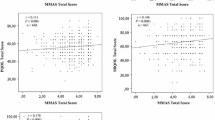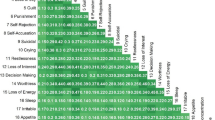Abstract
Background
Several studies have shown that non-adherence is a common and increasing problem among individuals with chronic illnesses, including hemodialysis patients.
Purpose
The present study aimed to investigate the influence of depression and health cognitions on medication adherence among patients undergoing hemodialysis.
Method
A sample of 168 participants was recruited from six general hospitals in the broader area of Athens, consisting of patients undergoing in-center hemodialysis. Measurements were conducted with the following instruments: the Medication Adherence Rating Scale, the Center for Epidemiologic Studies Depression Scale (CES-D), and the Multidimensional Health Locus of Control (MHLC) scale.
Results
The results indicated that medication adherence was associated positively with the dimensions of internal and doctor-attributed health locus of control, measured by the MHLC. It was also related negatively to depression, measured by the CES-D.
Conclusions
The present study demonstrates the importance of depression in understanding the medication adherence of hemodialysis patients, as well as the contribution of heath cognitions.
Similar content being viewed by others
References
Ginieri-Coccossis M, Theofilou P, Synodinou C, Tomaras V, Soldatos C. Quality of life, mental health and health beliefs in haemodialysis and peritoneal dialysis patients: investigating differences in early and later years of current treatment. BMC Nephrol. 2008;9:1–9.
Theofilou P. Sexual functioning in chronic kidney disease: the association with depression and anxiety. Hemodial Int. 2011. doi:10.1111/j.1542-4758.2011.00585.x.
Theofilou P. Depression and anxiety in patients with chronic renal failure: the effect of sociodemographic characteristics. Int. J. Nephrol. 2011; 1-6.
Theofilou P. Quality of life in patients undergoing haemodialysis or peritoneal dialysis treatment. J Clin Med Res. 2011;3:132–8.
Theofilou P. The relation of social support to mental health and locus of control. J Renal Nurs. 2012;4:18–22.
Theofilou P. Self-esteem in Greek dialysis patients: the contribution of health locus of control. Iran J Kidney Dis. 2012;6:2.
Manley HJ, Garvin CG, Drayer DK, Reid GM, Bender WL, Neufeld TK. Medication prescribing patterns in ambulatory haemodialysis patients: comparisons of USRDS to a large not-for-profit dialysis provider. Nephrol Dial Transplant. 2004;19:1842–8.
Chiu YW, Teitelbaum I, Misra M, de Leon EM, Adize T, Mehrotra R. Pill burden, adherence, hyperphosphatemia and quality of life in maintenance dialysis patients. Clin J Am Soc Nephrol. 2009;4:1089–109.
Theofilou P. Non-compliance with medical regimen in haemodialysis treatment: a case study. Case Reports in Nephrology 2011; 1–4.
Sabate E. Adherence to long-term therapies: Evidence for action. Geneva: World Health Organization; 2003.
Haynes R, Ackloo E, Sahota N, McDonald H. Interventions for enhancing medication adherence. Cochrane Database Syst Rev (2) 2008; CD000011.
National Kidney Foundation. Clinical practice guidelines and clinical practice recommendations for hemodialysis adequacy, update 2006. Am J Kidney Dis. 2006;48:S2–S90.
Timmers L, Thong SYM, Dekker WF. Illness perceptions in dialysis patients and their association with quality of life. Psychol Heal. 2008;23:679–90.
Theofilou P. Quality of life and mental health in haemodialysis and peritoneal dialysis patients: the role of health beliefs. Int Urol Nephrol. 2011e. doi:10.1007/s11255-011-9975-0.
Cameron C. Patient compliance: recognition of factors involved and suggestions for promoting compliance with therapeutic regimens. J Adv Nurs. 1996;24:244–50.
Marks I. Deconstructing locus of control: implications for practitioners. J Couns Dev. 1998;76:251.
Kehoe WA, Katz RC. Health behavior and pharmacotherapy. Ann Pharmachother. 1998;32:1076–86.
Horne R, Weinman J. Self-regulation and self-management in asthma: exploring the role of illness perceptions and treatment beliefs in explaining non-adherence to preventer medication. Psychol Heal. 2002;17:17–32.
Axelsson M. Personality and adherence to medication treatment. Sweden: Intellecta Infolog AB; 2011.
Mårdby AC, Åkerlind I, Jörgensen T. Beliefs about medicines and self-reported adherence among pharmacy clients. Patient Educ Counsel. 2007;69:158–64.
Hann D, Winter K, Jacobsen P. Measurement of depressive symptoms in cancer patients: evaluation of the Center for Epidemiological Studies Depression Scale (CES-D). J Psychosom Res. 1999;46:437–43.
Radloff LS. The CES-D scale: a self-report depression scale for research in the general population. Appl Psychol Meas. 1977;1:385–401.
Zich JM, Attkisson CC. Screening for depression in primary care clinics: the CES-D and the BDI. Int J Psychiatry Med. 1990;20:259–77.
Geisser ME, Roth RS, Robinson ME. Assessing depression among persons with chronic pain using the Center for Epidemiological Studies Depression Scale and the Beck Depression Inventory: a comparative analysis. Clin J Pain. 1997;13:163–70.
Wallston BS, Wallston KA. The development and validation of the health related locus of control (HLC) scale. J Consult Clin Psychol. 1976;44:580–5.
Wallston BS, Wallston KA, DeVellis R. Development of the multidimensional health locus of control (MHLC) scale. Heal Educ Monogr. 1978;6:160–70.
Hong TB, Oddone EZ, Dudley TK, Bosworth HB. Medication barriers and anti-hypertensive medication adherence: the moderating role of locus of control. Psychol Health Med. 2006;11:20–8.
Myers L, Myers F. The relationship between control beliefs and self-reported adherence in adults with cystic fibrosis. Psychol Health Med. 1999;4:387–91.
Christiansen A, Wiebe J, Benotsch E, Lawton W. Perceived health competence, health locus of control, and patient adherence in renal dialysis. Cogn Ther Res. 1996;20:411–21.
Azlin B, Hatta S, Norzila Z, Sharifa Ezat WP. Health locus of control among non-compliance hypertensive patients undergoing pharmacotherapy. Malays J Psychiatry. 2007;16:20–39.
Karamanidou C, Clatworthy J, Weinman J, Horne R. A systematic review of the prevalence and determinants of non-adherence to phosphate binding medication in patients with end stage renal disease. BMC Nephrol. 2008;9:1–10.
Akman B, Uyar M, Afsar B. Adherence, depression and quality of life in patients on a renal transplantation waiting list. Transpl Int. 2007;5:1–6.
Harris T, Cook D, Victor C, Rink E, Mann A, Shah S, et al. Predictors of depressive symptoms in older people—a survey of two general practice populations. Age and Ageing. 2003;32:510–8.
Meyers KR. Religiosity and health locus of control as predictors of depression and anxiety in women with breast cancer. ETD Collection for Fordham University. 2002; Paper AAI3056149 http://fordham.bepress.com/dissertations/AAI3056149
Granger BB, Ekman I, Granger CB, Ostergren J, Olofsson B, Michelson E, et al. Adherence to medication according to sex and age in the CHARM programme. Eur J Hear Fail. 2009;11:1092–8.
Moreira L, Fernandes P, Monte S, Martins A. Adesão ao tratamento farmacológico em pacientes com doença renal crônica. J Bras Nefrol. 2008;30:113–9.
Adisa R, Fakeye TO, Fasanmade A. Medication adherence among ambulatory patients with type 2 diabetes in a tertiary healthcare setting in southwestern Nigeria. Pharmacy Practice (Internet). 2011;9:72–81.
Ponnusankar S, Surulivelrajan M, Anandamoorthy N. Assessment of impact of medication counseling on patients’ medication knowledge and compliance in an outpatient clinic in South India. Patient Educ Couns. 2004;54:55–60.
Choi-Kwon S, Kwon SU, Kim JS. Compliance with risk factor modification: early-onset versus late-onset stroke patients. Eur Neurol. 2005;54:204–11.
Mishra P, Hansen EH, Sabroe S. Socio-economic status and adherence to tuberculosis treatment: a case-control study in a district of Nepal. Int J Tuberc Lung Dis. 2005;9:1134–9.
Theofilou P, Geitona M. Comparative study of bicarbonate dialysis and haemodiafiltration in end-stage renal disease. Farmacoeconomics. 2008;36:5–11.
Gascon JJ, Sanchez-Ortuno M, Llor B. Treatment compliance in hypertension study group. Why hypertensive patients do not comply with the treatment: results from a qualitative study. Fam Pract. 2004;21:125–30.
Frazier PA, Davis-Ali SH, Dahl KE. Correlates of noncompliance among renal transplant recipients. Clin Transplant. 1994;8:550–7.
Combs DL, O’Brien RJ, Geiter LJ. Compliance with tuberculosis regimes: results from USPHS therapy trial 21. Am Rev Respir Dis. 1987;135:138.
International Union Against Tuberculosis Committee on Prophylaxis. Efficacy of various durations of isoniazid preventive therapy for tuberculosis: five years of follow-up in the IUAT trial. Bull World Health Organ. 1982;60:556–64.
Acknowledgments
The author would like to thank the patients for their participation in the study and acknowledge the support given by the health professionals and the administration personnel of the participating dialysis units.
Author information
Authors and Affiliations
Corresponding author
Rights and permissions
About this article
Cite this article
Theofilou, P. Medication Adherence in Greek Hemodialysis Patients: The Contribution of Depression and Health Cognitions. Int.J. Behav. Med. 20, 311–318 (2013). https://doi.org/10.1007/s12529-012-9231-8
Published:
Issue Date:
DOI: https://doi.org/10.1007/s12529-012-9231-8




